The Beginning
Better than Sliced Bread
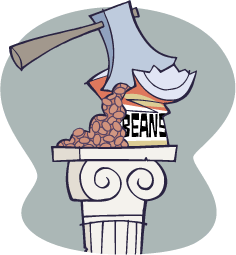
Have a look around your home or office. Just about everything you see was invented by someone, somewhere, some time or other. Everything but the dog and cat and possibly what the cat dragged in. Some notable inventions have creators’ names attached. Other great inventors are lost in antiquity. Nobody knows who came up with the wheel, the cam, pottery, or the horseshoe. Often inventions are so seemingly simple or taken for granted they are overlooked for what they are; life-changing innovations. Below are but a handful.
Ball Bearings Arguably one of the most important inventions of all time, yet it never seems to get its due. In olden times to reduce friction and prevent wear on axles people used only grease, gobs of it. Such measures simply would not suffice for the ever bigger, faster and more powerful machines of the modern age. Ball bearings reduce the coefficient of friction by a factor of a thousand, without them the industrial revolution could hardly have gotten very far, literally in the case of railroads. There wouldn’t be high speed electric motors and dynamos, it would be lights out if not for ball bearings.
The idea of ball bearings are found in Da Vinci’s sketch books. The modern ball bearing was invented in 1794 to reduce friction in carriage wheels by Philip Vaughan, of Carpathian, Wales. With the advent of the bicycle and automobile about a century later, together with machines which could grind the metal balls accurately, ball bearings really got going big time.
This illustrates an important point, it’s one thing to think of something, quite another to be able to actually make it. The state of the art of tools and technology make a big difference. The steam engine wasn’t possible until they developed means of making pistons and boring cylinders accurately. So sometimes an invention isn’t the thing itself, but a way to make it. Which leads us to…
The Machine-Made Nail It seems strange that something as common as the common nail was ever, uh… uncommon. But it was. Nails have been around a long time, but they were hand made by blacksmiths which was both time consuming and expensive. So valuable were nails that at one time decrepit structures were burned to the ground to recover the nails.
The first machine-made nails were squarish cut nails rather than the round, wire nails most often used today. Though records are as scant as hand made nails, it is believed these machines were developed in New England around the turn of the 19th century. The machine-made nail led to…
The Balloon Frame House The cheap mass-produced nail revolutionized building methods. It dispensed with the need for highly skilled craftsman to build structures using post and beam framing with mortise and tenon joinery. Instead you needed only a gang of carpenters hammering nails to form bearing sheet walls, which also required smaller timbers making housing cheaper and faster to build.
The balloon frame house was developed gradually over time in various places in the U.S. The modern form used today, where the timbers provide strength and the sheeting gives it rigidity and helps spread the load, was pretty much finalized in the 1880s or thereabouts. Then the balloon mortgage was invented to pay for it all. All this easy to build housing contained another innovative feature…
The Hallway A common corridor leading to separate rooms changed the way families lived, helping usher in the modern idea of privacy. If you tour the old manor houses of England you’ll notice rooms open into other rooms, there are no hallways as such. You can’t have much privacy if your bedroom is on the way to the loo. A hall then was more in the way of a gallery, a large room, in the modern vernacular a great room. Separate rooms for privacy came about because of…
The Fireplace and Chimney Before that fires burned in the center of large common rooms which had a hole in the roof to let the fumes escape. The fireplace could be built because of the invention of… Masonry. Ok, I think you get the idea, one thing leads to another. While they do, sometimes it takes a little longer for people to connect the dots than you might suppose. Take for instance…
Clock Hands One might wonder what good a clock is without hands indicating the hours and minutes. Originally mechanical clocks were a method of calling monks to prayer by automatically ringing bells at the prescribed hour. These were an improvement over sun dials which weren’t very helpful on cloudy days or at night. They also replaced the water clock, or clepsydra, which didn’t work in northern climes when it got below freezing.
The Buttonhole Buttons and buttonholes go together like mom and apple pie, but this was not always the case. Buttons have been around a lot longer than buttonholes. The oversight was likely because you can’t make money selling holes like you can selling buttons.
Clothes were originally held together by wrapping, belting, tying, tucking and straight pins. Buttons were decorative or used for tying or with a loop until someone had the bright idea to make a simpler buttonhole. When and where exactly is a mystery to me. It certainly made dressing faster and easier and was a great relief to everyone using pins as fasteners. And a great boon to button makers I’m sure. Speaking of clothing the masses, here’s another innovation you may not have considered…
Standard Clothing Sizes Before the age of Napoleon, nobody was a 38 medium. Perhaps they were that size, but the term didn’t exist. Prior to that, all clothing was custom made for the individual, either by tailors or at home. But if you want to outfit 100,000 soldiers to invade Russia that’s not a very efficient method. Instead they mass produced the uniforms to common sizes for the common soldier. It’s one thing to clothe a huge army on the march, but quite another to feed it. This brings us to…
Can and Can Opener Like buttons and buttonholes, the can and can opener made separate appearances. The can obviously came first, you don’t need an opener for something which doesn’t exist. Canning was invented in Napoleonic France to supply the ever growing Imperial army in the field, first being done in champaign bottles and later in metal cans. These cans were opened with whatever tool was handy. An ax, knife, bayonette or a hammer and chisel were commonly used.
Decades later the levered knife-like can opener designed for the task came about. The cranking, wheeled type now so popular is a Johnny come lately. Yet shade tree mechanics still sometimes open oil cans with screw drivers. While a can will keep your food from spoiling and is easier and less messy to store and stack than great heaps of loose food, it won’t keep it at a yummy eating temperature. For that we have…
Vacuum Bottle, or Thermos Physicist and chemist James Dewar invented the vacuum flask in 1892. It kept hot things hot, and cold things cold. How did it know?
OK, that last one is an old joke. Other inventions were more important, the wheel or maybe the moldboard plow for instance. Possibly shoes or shoe laces, or those little plastic dohickies on the end of shoe laces that keep them from unravelling, aglets they’re called. I just wanted to give credit where it’s due for the often overlooked. Everyone loves an underdog, and every dog should have its day.
Paradise Lost
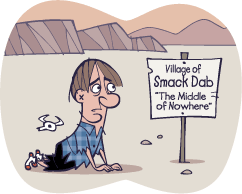
utopia (yū tō′ pē-ə) noun, 1. Any condition, place, or situation of social or political perfection. 2. Any idealistic goal or concept for social or political reform.
Utopia is a word from Greek roots coined by Sir Thomas Moore in his 1516 novel, Utopia. Which translates as nowhere. (ou, not + topos, place) This should give you a good hint as why utopias are very hard to create. You can’t have some-place that’s no-place. Something not unlike the way Dorothy Parker once quipped, “There’s no there there.”
Cave Chef
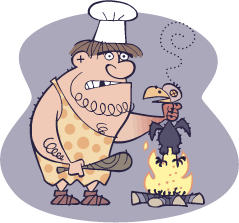
How did cooking ever start? It’s not like it’s an obvious thing to do, dash perfectly good food in a roaring fire then drag it out and eat it. How did cavemen come up with it? I’m also curious how they figured out some things which are deadly when raw are safe when cooked. Serendipity? Trial and error? I wouldn’t want to belong to that test kitchen.
Then again, they figured out if you lobbed a virgin in a volcano you’d get good weather, avoid plague and pestilence, and win the lottery. Caveman science worked in mysterious ways.
Junkfood or Junk Word?
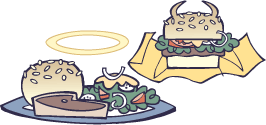
Ask yourself, what is and what isn’t junk food exactly. It isn’t all that well defined. If you were served a small chuck steak, a dinner roll, and a salad of lettuce, tomato, onions and cucumber with thousand island dressing on a plate, that’s a regular meal.
If you grind up the steak, cut the roll in half and stuff the steak and the salad inside, you essentially have a Whopper. Which is junk food. So, as far as I can figure, junk food comes in paper and regular food comes on a plate.
Infrequently Answered Questions
You Could do Both

Q: Is it better to light a candle than curse the darkness?
A: In the darkness it is better to sleep than either of the above. Having lit candles strewn about while sleeping is a fire hazard and I recommend against this practice. There is no harm in cursing in your sleep, unless you live with easily irritated gun owners or homicidal maniacs, or worse, both.
Should you feel the need to move about at night, I suggest you “turn on a light” as the saying goes. The light control is usually found on the wall near the entrance, about 4 feet up. Find this device, generally rectangular in shape, and flip the toggle up (down in the UK) to “turn on the light.” If this doesn’t work, curse, and then light a candle.
Basically, Helots
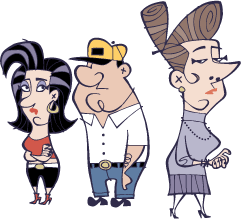
hoi polloi (hoi pə loi′) noun The common people viewed from a position of social or intellectual advantage or privilege.
This is another one of those terms I hear people being mixed up about, often thinking it means the elite, the upper class, the rich and powerful, the upper crust. But it means the opposite; the masses, the rabble, the ruck, the great unwashed, the many-headed, the plebs, the common folk, et al. I can only guess these people confuse hoi polloi as being somehow related to…
hoity-toity (hoi tē-toi′ tē) adj. Arrogant, pompous, pretentious.
In other words, snobbery and snobs. Who are often the elite, the upper crust, etc.
No More Mr. Nice Guy
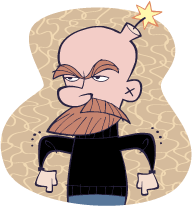
irascible (ĭ rās′ ə-bəl) adj. Easily provoked or angered.
This word is the formal equivalent of the everyday words and expressions testy, cranky, touchy, cantankerous, peevish, hot-headed, quick-tempered, thin-skinned or having a hair trigger or a short fuse. Which might be why you don’t hear it very often. Who needs it when we have these more colorful versions. Like the related phrase “flying off the handle.” Though when examined it’s hard to figure out how such an expression came about. Can people actually fly off handles? Handles of what? It’s rather nonsensical when you think about it.
What a Way to Go

Comedians seem to think there’s a connection between comedy and death. For instance, when their act goes over they say they slayed the audience, or they killed out there. When the act goes badly it’s the comic who died out there, or they bombed.
The Fake Drake Equation

Ever see NUMB3RS? I’m somewhat dubious about some of the math. Not that it’s phony, but how does professor Epps come up with the formulas and logarithms so fast? Though mostly I wonder, where does he get the values to plug in?
It reminds me of the Drake equation that was supposed to calculate the likelihood of extraterrestrial life communicating with Earth:
N x fp x ne x fl x fi x fc x fL = ?
N is the number of stars in the Milky Way galaxy; fp is the fraction with planets; ne is the number of planets per star capable of supporting life; fl is the fraction of planets where life evolves; fi is the fraction where intelligent life evolves; fc is the fraction that communicates; and fL is the fraction of the planet’s life during which the communicating civilizations live.
The problem is there is only one value that is even close to being know, the number of stars in the galaxy. The rest is pure guesswork. So, without good information to put in the equation, it’s worthless. All we know for sure is there’s at least one chance of it, Earth.
Shadowy Talk

aspersion (ă-spər′ zhən) noun 1. Slander, a calumnious report or remark. 2. The act of defaming or slandering.
How often have you heard anyone protest about someone casting aspersions on their character? Why is it aspersions always seem to be cast? Can they also be tossed, thrown, lobbed, floated or distributed in some other way? Is this casting like casting a shadow or casting for fish with a rod and reel? And why does it seem always to be plural, aspersions, rather than just one aspersion?
Actually there is a reason, but it goes to another meaning of the word. Which is: aspersion, n. 3. A sprinkling: especially, a baptism by sprinkling.
This means you can have an aspersion (sprinkling, casting) of aspersions (slanders, defamations) against someone’s character. They just naturally go together, sort-of. I’m sure that’s all crystal clear as mud. Though I rather imagine the reader would also like to know what calumnious means. I’ll get to that some other time.
The Casual Sportsman
Dressed to Coach
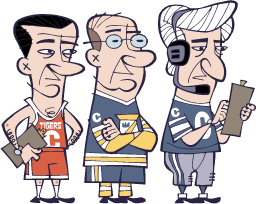
Do you find it strange that baseball managers wear uniforms just like the players? It’s not like they’re going to put themselves in the line-up, and so need to be dressed to play. No other sport does anything like this. Chalk it up to tradition. Still, it’s a bit odd.
Less Is the Same
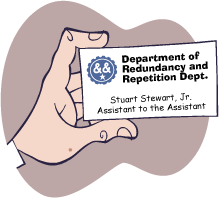
Why do people say, “Use your PIN number at the ATM machine” even though the N in PIN is for ‘number’ and the M in ATM is for ‘machine.’ Which means the statement with the acronyms spelled out is, “Use your personal identification number number at the automatic teller machine machine.”
What can I say, some people are stupid idiots.
The Nazis Gave Propaganda a Bad Name

I imagine many people will think the title of this entry is a joke, but it’s not. Consider, the Third Reich itself called it the Propaganda Ministry. They wouldn’t have called it that if propaganda implied misinformation and lies as it does to many today. Here’s what it really means:
propaganda (prŏ′ pə găn′ dă) noun Speech intended to convince.
Then Goebbels got hold of it and its never been the same. Now folks infer it being something like…
sophistry (sŏf′ əs trē) noun A plausible but misleading or fallacious argument.
By the original definition advertising and political speech is propaganda, and so is a sunday sermon. Honesty and accuracy had nothing to do with it. It’s a shame because now we have two words people use for sophistry and nothing for what propaganda really means.
If only they’d have called it the Sophistry Ministry to begin with. Ironically, the Nazis were more forthright in calling it propaganda rather than the euphemistic terms used today, such as the Information Ministry, public relations, or press secretary.
Attack Plan Ar-r-r-choo
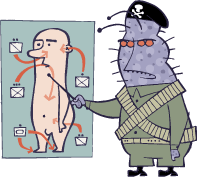
Micro-organisms living on or inside people outnumber human cells ten to one. Or so I’ve heard. You could say the human body is crawling with life. Still, while they outnumber us, their biomass is miniscule compared to ours.
Microbes can attain resistance to antibiotics by getting genetic material from other microbes, bypassing the natural selection route of evolution. Which means so-called superbugs can be created not by accident, but by a sort-of germ warfare plot going on in our guts.
A little note on anti-bacterial soap. Mostly, the harmful bacteria we fear making us sick or worse live in the dirt and oils that soil your hands. Washing with regular soap eliminating the grime containing the germs and washing it down the drain is just as effective as if you kill the germs first and wash them down the drain. You might be interested to know surgeons scrub with regular soap and water. The bottom line, anti-bacterial soap is pretty much a marketing gimmick, there’s no advantage to using it.
Animal Trivia

Despite the black around the eyes, the giant panda is not a really big relative of the raccoon as some like to claim. On the other hand a koala bear isn’t a bear, it’s a marsupial like a kangaroo or a wallaby. Another Australian oddity, the duck-billed platypus isn’t a marsupial, it’s a monotreme. Marsupials don’t lay eggs, the platypuss, which means “flat-footed,” lays eggs.
The Casual Sportsman
The Similarities are Different Between Baseball Then and Now
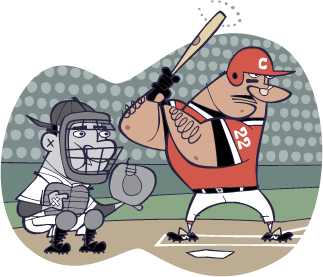
Baseball sure has changed from when I was a kid. Besides having more teams and inter-league play, there’s a few other alterations you see in the show. I’m referring to four things: players, player substitution, scheduling, and one major rule change.
Players. I’m not talking about how they’re all pumped up on steroids and the medical marvels that allow them to pitch until they’re eligible for social security. What’s different is the number of foreigners that play in the bigs. There were some latin players back in the 60s, but not nearly as many as today. And Japanese players stayed in Japan.
Player Substitution. In the old days your everyday players played, well, every day. None of that one line-up vs. righties and another against southpaws. The line-up was pretty much the same all the time. Plus pitching wasn’t done by committee. A lot more complete games in the past, and as a consequence a lot fewer saves. The starting rotation was shorter, too. A star pitcher got many more starts back then, over forty. How else could Denny McLain have won 30 games? Nowadays they get between 35 and 40.
Scheduling. Even though they still play 162 games, the same as before, the season is longer. Used to be the October classic was in early October not encroaching on Thanksgiving. Two reasons for this. The obvious one is the additional playoff rounds. When I was a lad, they didn’t have them. The pennant winner was the team that finished in first place and went directly to the World Series. The second reason most young people probably wouldn’t guess. They used to schedule a lot more double-headers. In fact, they were a regular part of the season. Now they only have them to make up rain-outs.
Rule Change. The biggest rule change was bringing in the designated hitter. This idea came about because of the way pitching was dominating baseball in the 60s. Carl Yasztremski won the batting crown in 1968 with a .301 average. To get some offensive punch back in the game they came up with the designated hitter because, as everyone knows, pitchers can’t hit. They also lowered the mound and made the strike zone smaller, but those changes weren’t as radical as the DH.
Thing is, there’s no lack of offensive firepower in baseball these days. Isn’t it time to get rid of this rule and go back to “real” baseball. The way they play it in the National League? The way it was played in the American League for 70 years before? To my way of thinking, there’s two things we should try to eliminate from baseball, the designated hitter and steroids. The first is easy, the second... one can only hope.
What Everyone Wants

The three things everyone wants in any service are fast, good, and cheap.
Getting all three is called a miracle.
Getting two out of three is called a good deal.
Getting one out of three is called a poor deal.
Getting none of the three is called a government program.
Small Expectations of Everyday Things
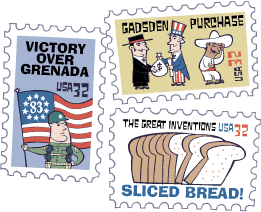
Ever notice the new peel-and-stick postage stamps have that perforated-like edge even though there’s no reason for it? It’s a throwback to the old lick-and-stick sheets of stamps that were perforated to tear and separate them.
It’s a vestige of a bygone era. People expect stamps to have that serrated edge, or they wouldn’t seem like stamps. Sort of like the grillwork on a car, which used to be radiator trim. The radiator isn’t right there in the grillwork any more. In a lot of cases, cars get more cooling air from below the grill in an opening in the bumper area. People just expect cars to have a grill, so they do.
The ipod has something of a pseudo-vestige, the controller clicks when you work it. There’s no real reason for it to do so, but people like hearing a click when they push buttons. Lets them know it’s working. Apple had to add on the clicking sound because the controller gizmo doesn’t make a sound otherwise.
Very Big of You
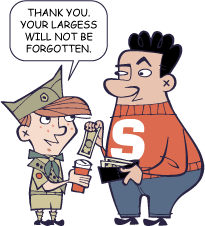
largess (lär jəs′) noun 1. a. Liberality in giving. b. The money or gifts bestowed. 2. A bounty, dole, or tip. 3. Generosity of attitude.
pun (pŭn) noun, A play on words, sometimes on different senses of the same word and sometimes on the similar sense or sound of different words.
I tossed in two puns. Many people think a pun is the lowest form of humor. And a pun making fun of a naughty bit must be the lowest of the low. Still, I couldn’t resist.
Berzerkr Runs Amok
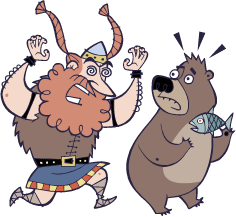
berserk (bər zŭrk′) adj. 1. Destructively or frenetically violent. 2. Deranged.
So, why the crazy Viking attacking a bear, you ask. The word derives from the Norse, berserkr, bear skin, the garment of choice for all self-respecting Vikings. As for attacking a bear bare-handed, you’d have to have gone berserk to attempt it.
Though someone gone berserk is now a crazy man, berserkr originally meant something more along the lines of a bodyguard, crazy or not.
Bodily Trivia

The brain is not “gray matter.” This was commonly thought so because people were looking at the brains of cadavers. In living people the brain is full of blood and is pink. So if someone accuses you of lacking gray matter, agree and thank them because it means you’re not brain dead.
Despite being the control center for pretty much everything outside autonomic functions, the brain doesn’t feel anything. When you get a headache you don’t feel it in the brain, but in the skin and muscles over the skull. Most internal organs don’t have the kind of nerves or receptors that we experience pain with.
You do feel pain in the stomach and lungs, but in a way these are not really internal organs. The digestive system is like a tube and everything passing through remains outside the insides, so to speak. The lungs are similar only there’s only one way in and out.
Polar Tidbit

No matter how hungry polar bears get they don’t resort to eating penguins. They don’t eat Santa’s elves either. Polar bears live in the Arctic which is at the North Pole and penguins live in the Antarctic, the South Pole. Santa’s elves, on the other hand, simply don’t exist. As far as polar bears know, penguins don’t exist either.
King Ethelredeless

Ethelred “the Unready” was an early British king, but the name is a bit of a misnomer. It’s a bastardization of Ethelred “the Unread” (Ethelred “the Redeless”), which doesn’t mean, as some might suppose, he was illiterate, but rather he was ill-advised.
This has something to do with how people of the past always read aloud, even when reading to themselves. So reading was also speaking. This is reflected in our current phrases, “Read him his rights” or “Read the riot act.” Advice, both written and given in person, was also spoken, or “read” in the parlance of the time. To be unread in this instance was to not receive advice.
In a way, being unadvised would have made him unready. Which would return us full circle to Ethelred “the Unready.”
Enormous Mistake

enormity (ĕ-nōr′ mə-tē) noun 1. excessive wickedness, outrageousness. 2. a monstrous offense or evil, an outrage.
This is a word people often use incorrectly to mean enormousness, importance, or somesuch. It’s one of those 20 dollar words folks like to sprinkle in their conversation to sound smart and educated. I’ve nothing against using big words, especially when they have a unique, specific meaning or connotation that another word can’t convey. Or for comic effect. In either case, you need to know the real meaning to make it work. Using big words incorrectly just makes you appear silly and pretentious.
The Beginnings of One Size Misfits All
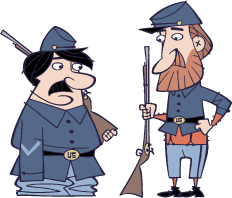
Sometimes the best innovation is not a thing, a product or gizmo of some sort, but a process or system. Take for instance, standardized clothing sizes developed by the quartermaster corps of the United States Army during the Civil War. Before that, all clothing in America was custom made for the individual, either by tailors or at home. That all clothing comes in sizes is something most people wouldn’t give a second thought to, but it is a fairly recent development and an innovative idea that’s now ubiquitous.
Olny Dmub Plpoee Buy It

This has been going around the email net:
Olny srmat poelpe can raed tihs.
Cdnuolt blveiee taht I cloud aulaclty unesdatnrd waht I was rdanieg. The phaonmneal pweor of the hmuan mnid, aoccdrnig to rscheearch at Cmabrigde Uinervtisy, it deosn’t mttaer in waht oredr the ltteers in a wrod are, the olny iprmoatnt tihng is taht the frist and lsat ltteer be in the rghit pclae. The rset can be a taotl mses and you can sitll raed it wouthit a porbelm.
Tihs is bcuseae the huanm mnid deos not raed ervey lteter by istlef, but the wrod as a wlohe…
To which I say, This pliatcarur pisoprootin is lleagry nnneosse.*
It’s a trick. It only works if you jumble the letters in a particular way so they’re easy to decipher because they’re common words and expected in the sentence. It’s easy to read because there are clues, such as letter pairs kept together and a similar number of syllables. Plus, words under five letters are deciphered simply. Here’s a sentence using words from the quote jumbled differently:
Inprmaott lteerts, aricdcnog to pnaamnoehl rascceherh plopee, mteatr bsueace sramt ploepe allutacy utrensnadd oedrr. **
Not as easy, eh? Bet you can’t figure out the following without some effort:
Seteneven frerams form atneohr crutony peesttord arligny oevr ieptmord ibreecg luctete.***
Stumped? Answers:
* This particular proposition is largely nonsense.
** Important letters, according to phenomenal research people, matter because smart people actually understand order.
*** Seventeen farmers from another country protested angrily over imported iceberg lettuce.
Fuzzy-Wuzzy
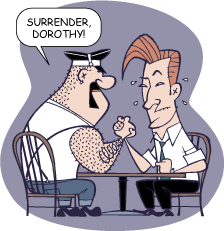
This is an illustration I did for Conan O’Brien vs. Bear, but they didn’t go for it. I did an alternate version, but I liked this one better and though I’d use it here. I suppose they didn’t think their audience would get the bear reference. Do you?
You Think In Your Head…

What’s with the expression, “I thought to myself”? Is there another way to think other than to yourself? Can you think to someone else, or to your dog, or to a chair? Perhaps you can, which would explain why people often want to bounce an idea off you.
People also claim to be thinking out loud, but really they’re just talking. And to listen to some folks prattling on, it’s clear that just because they’re talking doesn’t always mean they’re thinking.
The First Shall Be Last, That’s Just the Way Blogs Work

curmudgeon (kər mŭj′-ən) noun A cantankerous person; an ill-tempered and disagreeable person.